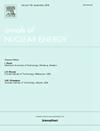Primary containment vessel management during severe accidents of the supercritical water-cooled fast reactor with in-vessel retention
IF 1.9
3区 工程技术
Q1 NUCLEAR SCIENCE & TECHNOLOGY
引用次数: 0
Abstract
The new Primary Containment Vessel management concept for severe accidents of the Supercritical Water-cooled Reactor (SCWR) has been proposed and the characteristics have been clarified through conceptual development of the Japanese fast reactor design (Super FR). The unique once-through direct cycle plant system of Super FR-IVR has enabled combining of In-vessel Retention (IVR) and the compact PCV with the Suppression Chamber (S/C). The plant behaviors during severe accidents were analyzed using MELCOR-2.2. The steam condensation by S/C showed good performance as IVR was effective in limiting the amount of non-condensable gas (H2 and CO) generation by eliminating Molten Core-Concrete Interaction (MCCI) and ex-vessel metal-water reactions. Furthermore, IVR was effective in controlling the D/W temperature close to saturation temperature of steam. These characteristics are advantageous for the plant system to avoid PCV venting as long as the ultimate heat sink is available or recovered for prolonged duration of the accident progression.
具有容器内滞留的超临界水冷快堆重大事故中主安全壳的管理
通过日本快堆设计(Super FR)的概念发展,提出了超临界水冷堆(SCWR)重大事故主安全壳管理的新概念,并阐明了其特点。Super FR-IVR独特的一次通过直接循环装置系统使容器内保留(IVR)和紧凑型PCV与抑制室(S/C)相结合。采用MELCOR-2.2软件分析了严重事故中的电站行为。S/C蒸汽冷凝表现出良好的性能,因为IVR通过消除熔融核心-混凝土相互作用(MCCI)和容器外金属-水反应,有效地限制了不可冷凝气体(H2和CO)的生生量。此外,IVR可以有效地控制蒸汽的水冷比温度接近饱和温度。这些特点有利于电厂系统避免PCV排气,只要最终的散热器是可用的或在事故进展的长时间内恢复。
本文章由计算机程序翻译,如有差异,请以英文原文为准。
求助全文
约1分钟内获得全文
求助全文
来源期刊

Annals of Nuclear Energy
工程技术-核科学技术
CiteScore
4.30
自引率
21.10%
发文量
632
审稿时长
7.3 months
期刊介绍:
Annals of Nuclear Energy provides an international medium for the communication of original research, ideas and developments in all areas of the field of nuclear energy science and technology. Its scope embraces nuclear fuel reserves, fuel cycles and cost, materials, processing, system and component technology (fission only), design and optimization, direct conversion of nuclear energy sources, environmental control, reactor physics, heat transfer and fluid dynamics, structural analysis, fuel management, future developments, nuclear fuel and safety, nuclear aerosol, neutron physics, computer technology (both software and hardware), risk assessment, radioactive waste disposal and reactor thermal hydraulics. Papers submitted to Annals need to demonstrate a clear link to nuclear power generation/nuclear engineering. Papers which deal with pure nuclear physics, pure health physics, imaging, or attenuation and shielding properties of concretes and various geological materials are not within the scope of the journal. Also, papers that deal with policy or economics are not within the scope of the journal.
 求助内容:
求助内容: 应助结果提醒方式:
应助结果提醒方式:


